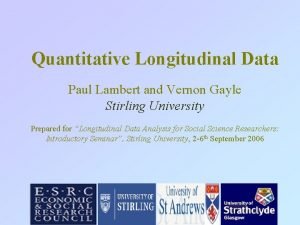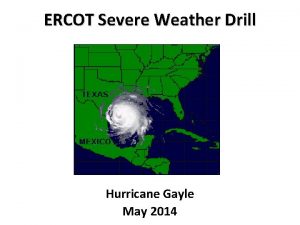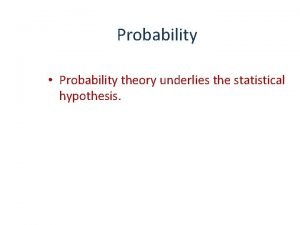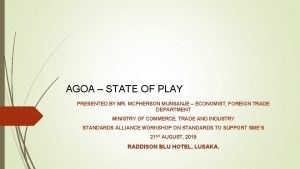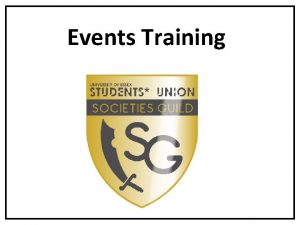The Politics of Securing Events DR GAYLE MCPHERSON








- Slides: 8

The Politics of Securing Events DR GAYLE MCPHERSON & DANIEL TURNER MAKING THE CASE FOR EVENTS

Context: The Need for Events Rise of the post-industrial service economy Cities competing on the basis of image to attract ‘new service intermediaries’ How many museums, cultural centres, convention and exhibitions halls, hotels, marinas, shopping malls, waterfront developments can we stand? ’ (Harvey, 1988) – Leads to the need for large scale events to provide one off boost to cities across a range of areas (economic, social, cultural, physical) Cities begin ‘making the case’ to host a range of cultural/sporting events and programmes Olympics, World Cups, Commonwealth Games, European Capital of Culture,

However… Key factor: How are decisions made when it comes to choosing whether to bid and which event to bid for? The act of deciding is itself an act of power… A defining characteristic of modernity is (group) contest over meaning. In a crisis of representation, a version of reality will be advanced. By excluding and displacing alternative voices it will favour only some groups, that is, will be political. Its grip over culture depends upon the extent to which the originator is able to assert its legitimation on the ‘opponent’ (Boyle and Hughes, 1991)

Power Steven Lukes – 3 dimensions of power One-dimensional Two-dimensional Power is decision making Exercised in formal institutions Measure it by the outcomes of decisions Decision making & agenda-setting Institutions & informal influences Measure extent of informal influence Three-dimensional (particularly important here) Shapes preferences via values, norms, ideologies All social interaction involves power because ideas operate behind all language and action Not obviously measurable: we must infer its existence (focus on language) These become routine - we don’t consciously ‘think’ of them - ‘It’s just common sense!’ “Common sense is the collection of prejudices acquired by age eighteen” – Albert Einstein Event bidding processes need to be understood as a hegemonic project designed to gain consent and minimise the ‘sceptics’ (Horne) message.

Convincing the internal stakeholders The PR role - to secure or ‘manufacture’ the consent of the public, both active support and passive acquiescence Select the right message for the right audience (commercial/government/public etc support)… what do they want to hear? Once the message is out there the power imbalance in terms of resources (financial, temporal, as well as strategic), access to media sources and intermediaries and credibility grows the message further until we get… The ‘common sense’ of bidding for the event: “going up against the Games…was like going up against Santa Claus. Why would you do that? ” (No Games 2010 Coalition) The derailment of dissenting voices before Glasgow 1990 (Boyle and Hughes, 1991)

What to bid for? ‘Tiers’ of peripatetic events 1 st tier – World Cup, Olympics 2 nd tier – European championships, Commonwealth Games 3 rd tier – African Cup of Nations, Asian Games The choice of prospective event infers both the status and aspirations of the prospective host. The way others see us… Glasgow, Delhi, Manchester London, Beijing, Athens, Sydney The way we see ourselves… ‘Los Angeles, Moscow, Montreal – that’s the company we keep, let’s see Toronto match that’ (John Gold)

Reasons for Bidding… Finance: The major inducement is financial - sponsorship & television rights covers most of the operating costs - US$2 – 2. 5 billion & vast television audiences - Beijing - estimated cumulative global television audience of 4. 7 billion Political gain – Los Angeles 84 vs Moscow 80, SNP support for 2014 Social / Cultural impact – Glasgow 1990, Liverpool 08, London 2012 Bidding to stimulate investment and development Posturing and Image – the bidding ‘gesture’, to be seen to bid is as important as winning the bid Bidding to prepare for the next bid (Manchester Olympic bid) The bidding process as an ‘event’ in its own right.

Key emerging issues… Strategies for actualising the bid? How to create a message which suits all stakeholders? Bidding, securing, planning and hosting the event – a ten year process - problems of sustaining the support secured at the outset?

